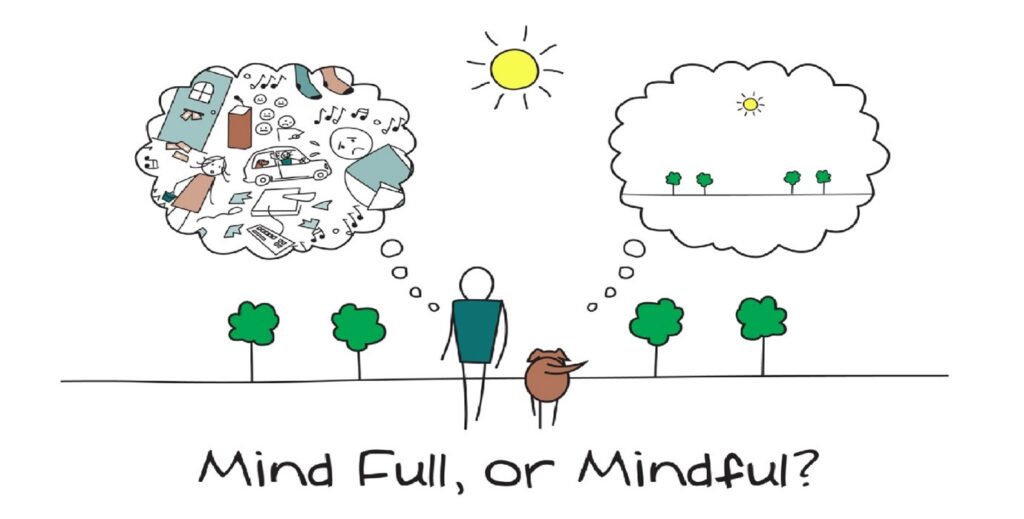In today’s fast-paced world, maintaining mental and emotional wellbeing can often feel like a struggle. Between personal responsibilities, work pressures, and the constant influx of information, it’s easy to become overwhelmed and disconnected from our inner selves. One practice that has been shown to significantly support mental and emotional health is mindfulness. But mindfulness doesn’t just benefit your mind—it can also influence your physical energy and emotional balance.
Mindfulness contributes to your wellbeing and it has an intriguing connection with energy psychology, a field that focuses on the link between psychological processes and the body’s energy systems.
What is Mindfulness?
Mindfulness is the practice of bringing one’s full attention to the present moment with an attitude of openness, curiosity, and non-judgment. This may sound simple, but in a world full of distractions, practicing mindfulness can be challenging. It involves being fully aware of your thoughts, emotions, bodily sensations, and the environment without becoming overwhelmed by them. Techniques such as mindful breathing, meditation, and body scans help cultivate this heightened awareness.
Over time, mindfulness has been shown to reduce stress, improve emotional regulation, enhance concentration, and promote overall wellbeing.
The Impact of Mindfulness on Wellbeing
- Stress Reduction One of the most widely recognized benefits of mindfulness is its ability to reduce stress. Research has shown that mindfulness meditation lowers levels of cortisol, the body’s primary stress hormone. By training the mind to stay grounded in the present moment, we are less likely to ruminate on past events or worry about the future—two major sources of stress.
- Emotional Regulation Mindfulness helps individuals develop greater emotional intelligence. By observing emotions without immediately reacting to them, we create a space for thoughtful responses rather than knee-jerk reactions. This leads to improved emotional regulation, less impulsivity, and a deeper understanding of our internal emotional landscape.
- Improved Relationships Mindfulness fosters empathy and active listening, both essential for healthy, fulfilling relationships. When we are present and attentive to others, we can more effectively respond to their needs and communicate authentically.
- Physical Health Mindfulness has been linked to various health benefits, including reduced blood pressure, improved sleep, and a stronger immune system. It activates the parasympathetic nervous system, also known as the “rest and digest” system, which counteracts the stress-induced “fight or flight” response. This shift helps the body recover from the physical effects of chronic stress.
Energy Psychology: An Overview
Energy psychology is an umbrella term for various therapeutic techniques that combine psychological processes with energy-based practices. The fundamental idea behind energy psychology is that our emotional and psychological challenges can manifest as disruptions or blockages in the body’s energy field. These disruptions can negatively impact our mental health and wellbeing.
Energy psychology techniques use various methods to restore balance to the body’s energy system. Some of the techniques used by Michele at Compass Counselling are the Emotion Code (clearing stuck emotions through a muscle testing process like kinesiology, and using the meridians), and Intuitive Healing techniques. These techniques are popular for their ability to quickly address emotional distress, trauma, and stress-related symptoms. More information about these techniques are in Compass Counselling’s blogs and on our webpage.
Mindfulness and Energy Psychology: The Connection
Both mindfulness and energy psychology share a similar goal: to enhance emotional and mental balance by engaging with the body’s energy systems. Here’s how they align:
- Awareness of Energy Flow Mindfulness helps individuals become more attuned to the sensations in their body, which is a crucial step in energy psychology. Many energy psychology practices involve paying attention to physical sensations and connecting to your intuition. The more aware we are of how our energy feels in a given moment, the more effectively we can identify and release blockages.
- Regulating the Nervous System Mindfulness and energy psychology both help regulate the nervous system. Mindfulness practices activate the parasympathetic nervous system, calming the body’s fight-or-flight response. In energy psychology, techniques like Emotion Code clearing and Intuitive Healing also aim to release emotional charges that are often stored in the body as tension, which can be contributing factors to stress or anxiety. These emotional blockages can also lead to physical illnesses over time. This dual approach of mindfulness and energy balancing promotes a sense of calm, safety, and equilibrium.
- Addressing Root Causes of Emotional Patterns Mindfulness encourages observing thoughts and emotions without attachment, which can help uncover long-standing emotional patterns or unresolved trauma. Energy psychology techniques like Emotion Code clearing and Intuitive Healing can then address these root causes by balancing the body’s energy system. By combining the awareness cultivated in mindfulness with the corrective energy work in energy psychology, individuals can experience profound emotional healing.
- Holistic Healing Approach Both mindfulness and energy psychology take a holistic approach to healing, recognizing the mind-body connection. While mindfulness fosters emotional resilience by cultivating self-awareness and acceptance, energy psychology works directly with the body’s energy systems to release emotional blockages. Together, they support a comprehensive, mind-body approach to wellbeing.
Practical Ways to Integrate Mindfulness and Energy Psychology into Your Life
- Practice Mindful Breathing: Set aside a few minutes each day to focus on your breath. As you breathe deeply and mindfully, tune into any areas of tension or discomfort in your body. If you notice any emotional blockages, consider using energy psychology techniques to address them. Michele can teach you how to do these techniques on yourself at home.
- Body Scan Meditation: A body scan meditation is a great way to enhance body awareness. This practice can help you tune into physical sensations and identify areas where tension or emotional blockages are held. Once these areas are identified, energy psychology practices like Emotion Code clearing or Intuitive Healing can be used to release them.
- Mindful Movement: Practices like yoga, Qi Gong, or tai chi combine mindfulness with physical movement, helping to release stuck energy in the body. These practices not only promote relaxation but also improve the flow of energy throughout the body.
Conclusion
Mindfulness and energy psychology both offer valuable tools for enhancing mental and emotional wellbeing. While mindfulness helps us cultivate awareness and emotional regulation, energy psychology addresses the energetic underpinnings of psychological distress, facilitating deep healing. Together, they create a powerful synergy that can promote balance, reduce stress, and enhance overall health. By incorporating mindfulness practices into your life alongside energy psychology techniques, you can unlock a new level of emotional resilience, clarity, and wellbeing.
Incorporating mindfulness and energy psychology into your daily routine doesn’t require major life changes, but it can lead to significant improvements in your mental, emotional, and physical health. Whether through simple breathing exercises or more advanced techniques like Emotion Code clearing and Intuitive Healing, the key is to begin with small, consistent practices and stay open to the healing process. Michele at Compass Counselling can assist you with removing your energetic blockages and show you Energy Psychology techniques to use at home. There are some additional references below if you would like to do some further reading on this topic.
References for Further Reading
- Carter, R. A. (2019). The Energy Codes: The 7-Step System to Awaken Your Spirit, Heal Your Body, and Live Your Best Life. Hay House.
- Discusses the relationship between energy healing and mindfulness, providing a system for improving your energy flow and overall health.
- Gallo, D. (Ed.) (2015). Energy Psychology: Theory, Research, and Practice. Energy Psychology Press.
- A thorough introduction to energy psychology, including its methods, principles, and applications for emotional and psychological healing.
- Kabat-Zinn, J. (2005). Wherever You Go, There You Are: Mindfulness Meditation in Everyday Life. Hyperion.
- A foundational text on mindfulness, written by one of the pioneers of mindfulness-based stress reduction (MBSR).
- Nelson, D. (2008). The Emotion Code: How to Release Your Trapped Emotions for Abundant Health, Love, and Happiness. Discover Healing.
- A detailed exploration of the Emotion Code method, which helps identify and release trapped emotions that may be impacting health and wellbeing.
- Siegel, D. J. (2007). The Mindful Brain: Reflection and Attunement in the Cultivation of Well-Being. Norton & Company.
- Explores how mindfulness affects the brain and overall well-being, with a focus on neuroscience and emotional regulation.
- Tart, C. T. (2017). Mindfulness and Health: The Scientific Evidence. Oxford University Press.
- A collection of studies and evidence examining the benefits of mindfulness on health, including its impact on stress reduction, emotional balance, and physical well-being.
- Whittaker, L. (2016). Intuitive Healing: The Power of Energy Medicine. Hay House.
- Offers practical guidance on developing intuitive healing abilities and incorporating them into energy psychology practices.








